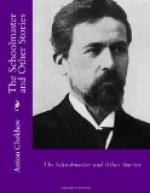Strizhin leads a sober and regular life. He has a sanctimonious expression of face, he reads nothing but religious and edifying books, but at the christening party, in his delight that Lyubov Spiridonovna had passed through her confinement successfully, he had permitted himself to drink four glasses of vodka and a glass of wine, the taste of which suggested something midway between vinegar and castor oil. Spirituous liquors are like sea-water and glory: the more you imbibe of them the greater your thirst. And now as he undressed, Strizhin was aware of an overwhelming craving for drink.
“I believe Dashenka has some vodka in the cupboard in the right-hand corner,” he thought. “If I drink one wine-glassful, she won’t notice it.”
After some hesitation, overcoming his fears, Strizhin went to the cupboard. Cautiously opening the door he felt in the right-hand corner for a bottle and poured out a wine-glassful, put the bottle back in its place, then, making the sign of the cross, drank it off. And immediately something like a miracle took place. Strizhin was flung back from the cupboard to the chest with fearful force like a bomb. There were flashes before his eyes, he felt as though he could not breathe, and all over his body he had a sensation as though he had fallen into a marsh full of leeches. It seemed to him as though, instead of vodka, he had swallowed dynamite, which blew up his body, the house, and the whole street. . . . His head, his arms, his legs—all seemed to be torn off and to be flying away somewhere to the devil, into space.
For some three minutes he lay on the chest, not moving and scarcely breathing, then he got up and asked himself:
“Where am I?”
The first thing of which he was clearly conscious on coming to himself was the pronounced smell of paraffin.
“Holy saints,” he thought in horror, “it’s paraffin I have drunk instead of vodka.”
The thought that he had poisoned himself threw him into a cold shiver, then into a fever. That it was really poison that he had taken was proved not only by the smell in the room but also by the burning taste in his mouth, the flashes before his eyes, the ringing in his head, and the colicky pain in his stomach. Feeling the approach of death and not buoying himself up with false hopes, he wanted to say good-bye to those nearest to him, and made his way to Dashenka’s bedroom (being a widower he had his sister-in-law called Dashenka, an old maid, living in the flat to keep house for him).
“Dashenka,” he said in a tearful voice as he went into the bedroom, “dear Dashenka!”
Something grumbled in the darkness and uttered a deep sigh.
“Dashenka.”
“Eh? What?” A woman’s voice articulated rapidly. “Is that you, Pyotr Petrovitch? Are you back already? Well, what is it? What has the baby been christened? Who was godmother?”
“The godmother was Natalya Andreyevna Velikosvyetsky, and the godfather Pavel Ivanitch Bezsonnitsin. . . . I . . . I believe, Dashenka, I am dying. And the baby has been christened Olimpiada, in honour of their kind patroness. . . . I . . . I have just drunk paraffin, Dashenka!”




